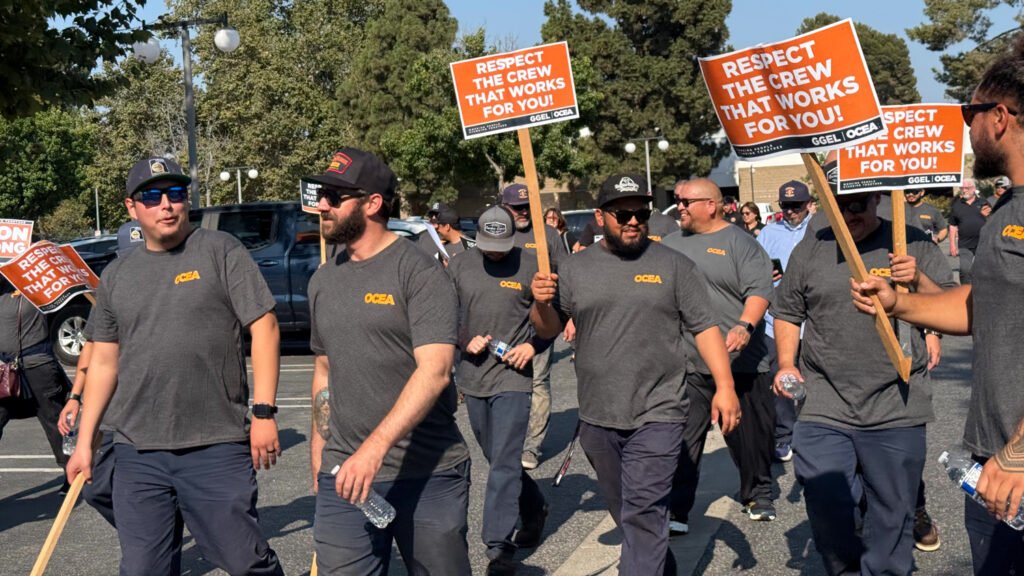Garden Grove Public Works Crews Rally for Raises
As the sun dipped below the horizon, the air echoed with chants of “Respect the crew that works for you!” from the public works employees of Garden Grove. This past Tuesday afternoon, approximately 50 dedicated workers poured into the streets around the civic center, rallying with urgency and conviction as tension mounted between them and the city council. Their demands? Fair wages to combat inflation and rising healthcare costs in a city that relies heavily on their tireless labor.
The Stakes of Negotiation
At the forefront of this labor upheaval is sanitation worker Brandon Nunes, who stood before the city’s council during a public meeting, visibly frustrated but resolute. “Does the city council care if the workers can’t reach an agreement?” he implored, highlighting what he sees as a failure to account for the lives of those who keep the city functional.
City officials have claimed they are offering “fair pay and benefits” consistent with other employee groups, but the public works crews beg to differ. Their grievances underscore a larger narrative about the struggle of public service workers during challenging economic times.
Background and Current Situation
The Garden Grove Employees League, a chapter of the Orange County Employees Association (OCEA), has found itself at an impasse after negotiations with city officials failed to yield an agreement on wage increases. Michael Rocha, president of the league, highlighted the vital services they provide, from maintaining 25,000 trees to ensuring the cleanliness of city streets and responding to the needs of the unhoused population. Despite the essential nature of their work, city council members, including Joe DoVinh, characterized their current offer as “market-competitive,” further fueling the divide.
OCEA Assistant General Manager Tim Steed criticized the city’s recent approach to negotiations, suggesting a “lack of respect” that prioritized an impersonal offer over meaningful dialogue. “They rushed to a final offer without considering our proposals,” Steed remarked, drawing attention to contentious issues like medical costs and wage increases for specialized roles such as heavy equipment operators.
Economic Pressures on Public Service Workers
The demand for a wage increase is not merely an issue of employment; it reflects broader economic pressures felt by public service workers nationwide. According to a recent fictitious study published by the “Institute for Labor Economics,” the average cost of living has surged by 15% in urban centers across California, yet wages in public service have stagnated, leaving workers grappling with financial strain.
- Inflation: A soaring inflation rate deepens the financial challenge for workers.
- Healthcare Costs: Rising premiums create additional strain on household budgets.
- Community Needs: Increased demands on public services exacerbate employee workloads.
As council members acknowledged, the city faces pressure to maintain fiscal responsibility while striving for equitable employee compensation. “Everyone’s not going to be happy – that is what success looks like,” DoVinh asserted, as he attempted to reconcile the conflicting interests at play.
The Human Element
The voices of public works employees echoed with a collective sense of urgency, demonstrating that each worker has a story that adds depth to this labor negotiation. Councilwoman Ariana Arestegui, who publicly supported the workers ahead of the march, expressed empathy for their plight: “These are people who work day in and day out to keep our city safe, clean, and functioning.” Her sentiments resonate not only with the workers but also reflect an understanding that financial worries today could lead to broader implications for community stability tomorrow.
The public works crews’ fight for fair remuneration is also a fight for recognition. In circumstances where financial pressures mount, the emotional and psychological toll on the workers must not be overlooked. Tim Steed observed, “At the end of the day, our members want to feel valued.” Striking that balance between fiscal prudence and the needs of those who serve the community is, therefore, crucial.
A Path Forward
As state mediators step in, both sides face a critical juncture. The upcoming mediation talks could either bridge the gap between workers and city officials or deepen the fracture that has formed over months of negotiations. City Council members have expressed optimism for a resolution but remain steadfast in their position that they have already proposed a fair deal.
Councilwoman Cindy Ngoc Tran called for “open minds” heading into the mediation session, indicating that both sides must be willing to compromise and recognize the realities on the ground. The future of public service in Garden Grove may hinge on these negotiations, and as city officials and public works employees alike look to resolve their differences, a collective focus remains on what’s at stake: the very services that sustain the community.
As the rally concluded and the workers dispersed, the shared sentiment lingered in the air—a reminder that behind every public service, there are lives and stories worth honoring. The city of Garden Grove now stands at a crossroads, where establishing respect and equitable treatment for its workforce is not just a negotiation tactic but a vital necessity for community resilience.





